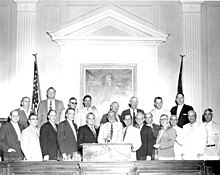Contents

The Pork Chop Gang was a group of 20 Democratic Party legislators from rural areas of North Florida who worked together to dominate the Florida legislature, especially to maintain segregation and conserve the disproportionate political power of mostly rural northern Florida. The origins of the name are obscure, referring either to a purported divide in the state's cuisine (pork supposedly being preferred in the north and lamb being preferred in the south) or to the legislative pork that the members of the Gang were allegedly awarding themselves.[1] They were active primarily from the 1930s to the 1960s, although the final "nail in their coffin" was in 1977.[2][3] The spokesperson was Senator Charley Johns. They "had become unusually powerful in the 1950s because the legislative districts of the state had not been redrawn to account for the massive growth of urban areas in earlier years."[4] The key figure in the group, coordinating their activities, although not a legislator, was industrialist Ed Ball. Their favorite haunt was the fish camp of legislator Raeburn C. Horne, at Nutall Rise, in Taylor County on the Aucilla River.[4] The group targeted communists and homosexuals.

Membership
The following legislators were members of the Pork Chop Gang in 1956, according to the captions on a photo of them in the state archives of Florida:[5]
Their public spokesman was Florida Senate President Charley Eugene Johns from Starke. The coalition supported racial segregation (which was practiced at Ball's St. Joe Paper Company, as it was at most companies in Florida at the time).
Activities

For nine years, the Pork Chop Gang, having failed in its investigation of alleged communism in the NAACP, devoted its efforts to identifying homosexuals in Florida universities and schools. "By 1963, more than 39 college professors and deans had been dismissed from their positions at the three state universities, and 71 teaching certificates were revoked."[6] See Homosexuality and Citizenship in Florida, a report prepared by the Florida Legislative Investigation Committee, popularly called the Johns Committee, since it was Johns' legislative project (to get the committee set up) and he was its chair.
Their downfall was the Constitution of 1968, which ended decades of misapportionment that favored rural north Florida over more populated central and south Florida,[7] and eliminated mandatory school segregation. However, it took a new state constitution to get them out.[8]
Professor Judith Poucher called the Johns Committee "Florida's version of McCarthyism".[9]
See also
References
- ^ Weitz, Seth (March 16, 2007). Bourbon, Pork Chops, and Red Peppers: Political Immorality in Florida, 1945-1968. Ph.D. dissertation, Florida State University. Archived from the original on June 6, 2021. Retrieved February 10, 2021.
- ^ "The final nail in the 'Pork Chop Gang' coffin". Tampa Tribune. September 1, 2013. Archived from the original on July 15, 2015. Retrieved July 14, 2015. [dead link]
- ^ Miller, James Nathan (July 1971). "How Florida threw out the pork chop gang". National Civic Review. 60 (7): 366–380. doi:10.1002/ncr.4100600704.
- ^ a b The Aucilla River Hideaway of Florida's 'Pork Chop Gang', Florida Memory, July 2, 2014, archived from the original on July 15, 2015, retrieved July 14, 2015
- ^ Group portrait of the Pork Chop Gang during the 1956 special session of the Senate, Florida Memory, 1956, archived from the original on July 15, 2015, retrieved July 14, 2015
- ^ Dare, Stephen (July 31, 2010). "Rise of The Pork Chop Gang. Conservative Racist Control from the 30s to the 60s". Metro Jacksonville. Archived from the original on March 22, 2021. Retrieved June 2, 2016.
- ^ Price, H. D. (1973) [1957]. "The Negro and the Legislature". The Negro and Southern Politics. A Chapter of Florida History. Westport, Connecticut: Greenwood Press. pp. 103–106. ISBN 0837168244.
- ^ ABC Television News (March 16, 2015). "The Last Standing Porkchopper". Archived from the original on July 16, 2015. Retrieved July 14, 2015.
- ^ Poucher, Judith G. (2014). Challenging the Johns Committee's Assault on Civil Liberties. University Press of Florida. ISBN 9780813049939. JSTOR j.ctvx075bh – via JSTOR.
Further reading
- Schnur, James A. "Cold Warriors in the Hot Sunshine: USF and the Johns Committee" (PDF). Archived from the original (PDF) on February 6, 2018. Retrieved February 4, 2018.

